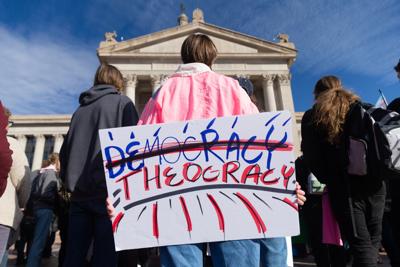Content warning: This article mentions suicide. A list of resources is included at the bottom of the story.
Chants of “trans lives matter” filled the air outside the Oklahoma state Capitol Monday as demonstrators decried proposed bills that would restrict gender-confirming care this legislative session.
About 150 people rallied against Senate Bill 129, which would ban gender-confirming care for Oklahomans under 26, and Senate Bill 252, which would restrict access to gender-confirming care for minors.
Most protestors focused on SB 129 when expressing disapproval. Doran Walters, an OU junior, said SB 129 will kill people that they care about.
Walters and Benjamin Patterson, a trans man, explained the importance of gathering together to protest this type of legislation. Walters said gatherings bring attention to trans issues and inform lawmakers that they have constituents who oppose these bills. Allies need to do everything they can, Walters said.
Patterson said it's vital to show legislators that the trans community will live their lives regardless of the “anti-trans rhetoric” coming from the Oklahoma Capitol building.
“We’re aiming to bring community together,” Patterson said.
Laine, a demonstrator who did not share a last name, shared similar sentiments as Patterson and explained how she thinks some of the legislation is misguided.
She said legislators have many beliefs that seem to be unfounded, including ideas that trans people are predators. Lawmakers fear the trans community as if trans people are coming for their kids, but in reality, trans people just want to live and mind their business, Laine said.
Marshall Ingram, demonstrator and co-president of the Prism Equality Club at the University of Science and Arts of Oklahoma, said the 2SLGBTQ+ community is constantly growing and the legislature tries to repress them because it fears that fact. More people are becoming comfortable with not only being out, but being proud of it as well, Ingram said.
During Gov. Kevin Stitt’s State of the State address Monday, he encouraged the ban of gender-confirming health care for all minors as part of his goal to improve the protection of Oklahomans.
Laine said she wants politicians to have meaningful conversations with members of the trans community. Knowing people in the community on a personal level can help them empathize, she said.
“It would really help if these people got to know us, and weren’t just living off of these unfounded claims,” Laine said.
She said restricting access to non-surgical forms of gender-confirming care is still harmful to the trans community.
“For a lot of trans people, small things like (hormone replacement therapy) just help trans people feel more like themselves,” Laine said.
Zephyr Cove, another demonstrator, said restricting access to HRT affects the whole population and the fight against these bills is everyone’s fight.
“Even people in menopause need hormone replacement because they just stopped producing enough estrogen on their own,” Cove said. “It's not just something that trans people need.”
They also said being trans or nonbinary is something kids can realize at a young age.
“You know that as soon as you have a sense of self,” Cove said. “These kids shouldn't be forced to have to deny that just because the people around them won't listen to them."
Cove said it does more harm than good to make trans youth wait for gender-confirming care because they will be more likely to experience depression and suicidal ideation as long as they are barred from treatment.
In the Trevor Project’s 2022 National Survey on LGBTQ Youth Mental Health survey, 22 percent of young trans men, 12 percent of young trans women and 19 percent of nonbinary youths attempted suicide.
Additionally, the survey found that 93 percent of trans and nonbinary youths fear they will be denied access to gender-confirming care due to state or local legislation.
According to research from Columbia University, gender-affirming care has consistently been shown to increase life satisfaction and mental health outcomes of transgender and nonbinary youth.
Ingram said they were severely struggling with mental health issues when they started HRT, and the four-month wait after finally getting an appointment was difficult.
“That’s why I advise so many people you have to talk now,” Ingram said. “You have to see what you can do now and do what you can.”
Patterson shared his final thoughts on the morality behind anti-trans legislation like SB 129.
“HRT isn't the only form of healthcare that's going to be banned, but it's the big one that they're going after,” Patterson said. “Working to ban HRT and other trans healthcare is active genocide. People will not survive to 26 to get that. For a lot of us, it is one of the only things that can help us feel at home in our body.”
Trevor Project: 866-488-7386, available through call, text or chat for 2SLGTBQ+ youths under 25.
GLBT National Help Center: 888-843-4564, available through call, online chat or email peer support.
SAGE: 877-360-5428, available 24/7 for 2SLGBTQ+ elders, their loved ones and caretakers.
This story was edited by Alexia Aston, Karoline Leonard and Jazz Wolfe.


